- Home
- Catherine Anderson
Summer Breeze Page 7
Summer Breeze Read online
Page 7
“Good family? Do your folks live around here?”
“My older brother, Ace Keegan, owns the spread northeast of here.”
“The piece of land that Patrick O’Shannessy sold?”
“That’s right.” Joseph glimpsed a thoughtful look in her eyes. “Ace married Patrick’s sister, Caitlin. He also built the railroad spur into Denver.”
“Caitlin?”
Joseph nodded. “Know her?”
“She’s older than me, but we went to school together for a number of years.”
“Did you now?” Joseph picked up a chunk of cornbread and took a bite.
Questions still lurked in her eyes. “How can Ace Keegan be your brother? You don’t have the same last name.”
“We’re actually only half brothers. When his pa died, our ma married my father, Joseph Paxton, senior. Back in sixty-five, he bought the piece of land that Ace owns now and moved our family out here from Virginia to make a fresh start. Unfortunately, things went sour, my ma took us boys to San Francisco, and none of us returned to No Name until four and a half years ago.”
Light dawned in her eyes. “Joseph Paxton,” she repeated softly. “I remember the name now.” A frown pleated her brow, and her blue eyes sharpened on his face. “He was hanged.”
Joseph winced, thinking that she’d picked a fine time to put all the pieces together. If she hadn’t heard the entire story, which was a strong possibility, she might panic for certain. “Wrongfully hanged,” he stressed, gesturing with the spoon. “My father was accused of squatting on the land he’d paid good money for and also of murdering Camlin Beckett, an upstanding citizen of No Name.” Joseph’s mouth went as dry as dirt. To this day, it wasn’t easy for him to recall his father’s death, let alone talk about it. “In truth, Beckett, Conor O’Shannessy, and a handful of others, including the town marshal, Estyn Beiler, were a bunch of swindlers, and my father was one of their victims. He just paid far more dearly than the rest.”
Her eyes went wide, but she said nothing to indicate what she might be thinking.
“Four and a half years ago,” Joseph went on, “all us boys returned to No Name to clear our father’s name. But maybe you never heard about that.”
She closed her eyes for a moment, and Joseph thought some of the tension eased from her shoulders. “I did hear about it. Darby isn’t much for talking, that’s true, but he told me about that. It was scandalous what Estyn Beiler and the others did to your father and family.”
In Joseph’s opinion, scandalous didn’t describe it by half, but he was so relieved she’d heard the whole story that he didn’t object.
She arched a delicate eyebrow. “Your brother, Ace Keegan—he’s a gunslinger of some reputation, isn’t he?”
“He gave all that up years ago.”
She sent him a dubious look.
“Ace and Caitlin have a son now,” he said, hoping to distract her from that train of thought. “Little Ace. He’s fourteen months old and cute as a button.”
“And you?”
Joseph paused with a spoonful of stew at his lips. “Me, what?”
“You have the look of a gunslinger, too.”
“I do?”
“Are you?”
He took the bite of stew. “This is downright delicious, Miss Hollister. Darby’s a lucky man if he gets to eat cooking like this every day.”
“You didn’t answer my question.”
He spooned in some more stew, chewed, and swallowed. “What question was that?”
“Are you fast with a gun?”
“Fair to middling. Ace is the one that’s fast.”
Joseph couldn’t see her feet, but he had a notion that she was tapping her toe. “Have you killed anyone, Mr. Paxton?”
Joseph decided then and there that honesty wasn’t always the best policy. In self-defense, he had, in fact, taken human life. That wasn’t something he wanted to talk about, especially not with a wary woman who might jump to wrong conclusions. “Do I look like a killer?”
“Yes.”
Well, hell. He’d finally met someone as plainspoken as he was. Time to turn the tables. “It seems to me it’s my turn to ask a few questions.”
She looked genuinely surprised. “I am not the interloper in this situation, Mr. Paxton. You’ve broken into my home, and you refuse to leave. I’ll ask the questions until I’m satisfied that you are who you say you are.”
“Ah, but I wouldn’t be here if Darby hadn’t insisted on it.” He took another bite of stew and studied her as he chewed. “Even doped up on laudanum, he was so worried about your safety that he was fit to be tied. Can you explain why?”
Her eyes went dark with shadows.
“That strikes me as being a little peculiar,” Joseph pressed on. “Why would Darby instantly conclude that the attack on him today was somehow connected to the attack on you and your family five years ago?”
She closed her eyes and shook her head. “I don’t know.” Her lashes lifted. “I truly don’t know.”
Her face had gone as pale as milk, and Joseph didn’t miss the fear that had returned to her eyes. “There has to be a reason,” he insisted. “He was scared to death for you and absolutely emphatic that your life might be in danger.” He studied her closely. “What do you remember about that day?”
“Nothing.” She swayed slightly on her feet and splayed a dainty hand over her midriff. “Darby was upset because he was shot near the creek.” The pitch of her voice went so low he almost didn’t catch her next words. “That’s why he made a connection, I’m sure, because that’s where it happened before.”
Watching her, Joseph tensed on the chair. “Don’t faint on me. If you fall, I’m not in there to catch you.”
She passed a trembling hand over her eyes. “I’m fine.”
Joseph knew better. She looked scared half to death, and his instincts told him that she was holding something back. Yet when he searched her gaze, he saw only frightened confusion.
“You must have some idea who killed your family,” he insisted.
The clawing fear in her eyes gave way to anger. “If I did, I would have screamed it to the rooftops years ago, Mr. Paxton.”
“I don’t buy that. You have a suspicion, at least.” Joseph honestly believed that was the only explanation for the way she lived. She was afraid of someone. She had to be. “I don’t know why, but you’re hiding something.”
“I remember nothing. Nothing, do you hear? It was my family that died!” She made a fist over her heart. “My mother, my father, my brother, and my sister. I loved them.” Her eyes went bright with tears. “If I had any inkling—even an unfounded suspicion of who killed them—do you honestly believe I would keep it to myself?”
Her question struck home for Joseph. He, too, had lost a loved one, and even today it still hurt him to think about that awful night. He’d been—what—eight years old? He couldn’t even remember his father clearly. How much more horrible must it be for Rachel Hollister, who’d been sixteen or seventeen at the time? She would have vivid memories of each person’s face and of the special moments she’d shared with them, particularly those last, precious moments right before they died. Naturally she would do everything within her power to see their killer brought to justice. He’d been wrong to imply otherwise.
“I don’t mean to upset you,” he said, his voice husky with regret.
She brushed angrily at her cheeks and whirled from the opening. A moment later, she passed by again, heading for the left rear corner of the room, the shotgun cradled in her arms. Joseph half expected to hear her start sobbing, but instead an awful silence settled over the house.
He finished his meal with one ear cocked, his gaze fixed on the hole. No sound. No sign of movement.When he’d cleaned his bowl, he left the dish on the table and crept over to the barricade.
Prior to this, Joseph had only caught glimpses of her sanctuary. The sight that greeted him was nothing short of amazing. Rachel had transformed the large ranch kitche
n into a one-room home, grouping furniture to create different sections. The front of the room still served as a kitchen, the corner to his right had been set up as a parlor, and to his immediate left was her sleeping area, comprised of a double bed, a night table, a chest of drawers, and an armoire. Granted, each area was crowded, but they provided her with all the amenities of a tiny house.
Rachel sat with her back pressed against the headboard of the bed, the shotgun on the mattress beside her. Her eyes were squeezed tightly shut, her fragile jaw set. Joseph took a moment to study her, and what he saw made his heart hurt. No tears, no jerking of her shoulders. Body rigid, she just sat there, hugging her knees as if that were all that held her together. Memories. He saw them etched on her face, the grief they brought drawing the skin taut over her cheekbones. He had intentionally forced her to think about that day without considering how painful it might be for her, not just during the conversation, but possibly long after.
Too late, he knew that his brother David was absolutely right. Sometimes the truth went down a little easier if you sprinkled it with sugar. He had no talent for that, never had and never would.
Until now, he’d never thought of it as a serious failing.
Chapter Five
Rachel’s eyes burned as if they’d been soaked in lye. She had no idea how long she’d been sitting on the bed, only that she’d been there for hours, listening to the rumble of Joseph Paxton’s snores. Her back felt as if the edge of a brutally sharp sword were pressing in just under her shoulder blades. She’d shifted and stretched, but the crick had taken up permanent residence. Quite simply, her body cried out for rest.
Unfortunately, Rachel couldn’t bring herself to lie down and try to sleep. Instead, she stared at the hole. It was the proverbial chink in her armor, a weakness in the fortress that had saved her sanity these last five years. Now she felt exposed and vulnerable in a way that made her skin crawl and her nerves leap.
Oddly, the man who slept in the other room was no longer the focus of her terror. His story about Darby rang true, and everything else he’d said rang true as well. He knew things about the old foreman that only a friend might—specifically that Darby wasn’t a talker and that he loved Rachel deeply enough to die for her. Rachel was also reassured by the fact that Joseph Paxton had foregone several opportunities to harm her. It was true that he could have grabbed her when she handed out his food. He looked to be a strong man and quick on his feet. There was also no denying that he could easily dispense with the boards over the doorway if he wished. With a couple of waist-high jabs of a boot, he could enlarge the hole, push through, and be on her. In that event, only her willingness to fire the shotgun would save her, and Rachel had a feeling he knew the thought of killing someone gave her the chills.
What had stopped him from entering her quarters? So far as Rachel could see, nothing, which had led her to conclude that he was who he claimed to be and had been sent by Darby, her beloved friend. The old foreman never would have sent a scapegrace to look after her. Rachel knew that beyond a doubt. Darby was nothing if not protective of her. He was also an astute judge of character. In short, Joseph Paxton had come with the very best of recommendations, and she would be foolish to distrust him.
He snorted just then, an abrupt, raucous catch of breath that was so loud Rachel could have sworn it vibrated the walls. It had been so long since she’d heard a man snore that she’d almost forgotten what a comforting sound it was. As a young child awakening from unpleasant dreams, she’d been comforted by the low, rhythmic rumble of her father’s snores, which had drifted through the entire house. It was a sound that said, “All is well.” And it had always lulled her back to sleep.
Joseph Paxton’s snores soothed her, too. Perhaps it was because she sensed that he was an alert, guarded man who slept with one eye open. Or maybe it was simply the sound of the snoring itself, which she’d known since infancy and come to associate with cozy warmth and safety.
His snores made her feel drowsy. Oh, how she wished she could stretch out on her soft bed and close her eyes. But with every creak and groan of the house, her heart shot up into her throat. Danger. It lurked beyond her walls, a constant threat.
Joseph Paxton’s presence didn’t allay her fears. Her father, Henry Hollister, had been a strong protector, every inch of his frame padded with steely muscle from a lifetime of hard work. And yet he had failed to keep his family safe. The danger had come unexpectedly and from out of nowhere, catching him unprepared. No man, no matter how strong and devoted, was impervious to a well-aimed bullet.
Rachel shivered and rubbed her arms. Her skin felt as if it were smeared with drying egg white. Oh, yes. The danger was out there. She had no idea where it lurked, only that it might strike again if she let down her guard.
That was the most awful part, the not knowing. It had her jumping at shadows, which went against her nature. Prior to the slayings, she’d been a fearless girl, always off and about, more tomboy than young lady, much to her mother’s dismay. One afternoon, a pair of rattlers in the barn had sent all the hired hands scattering, and it was Rachel who’d gone in to remove the snakes. The men had teased her mercilessly about her failure to kill the poor things, but she hadn’t let that bother her. It had been her belief then, and still was to this day, that all God’s creatures had a purpose and a right to live.
Perhaps that was why the murder of her family and dog still haunted her so—because the senseless violence was so inconceivable to her. Ever since she’d awakened from the coma, her world had been at sixes and sevens, a messy, untidy, chaotic, and askew reality interlaced with an awful unpredictability. And at the root of her confusion there was always a cloying fear—of the sunlight, of a breeze touching her face, even of the air itself—because she knew, deep down, that evil permeated everything beyond the safety of her walls.
Rachel couldn’t say how she knew that. The conviction was simply there, hiding behind a black curtain in her mind. She had no clear recollection of the tragic events of that fateful afternoon, only a compilation of facts related to her by Darby, who’d grown concerned when she and her family had failed to return to the house and had finally ridden to their picnic place along the creek to discover the bloodbath, and by Doc Halloway, who’d been summoned to the scene by one of the other ranch hands and had, as a result, treated Rachel’s head wound and nursed her back to health over the next few weeks.
Joseph Paxton had accused her of holding something back, of having memories of her family’s murder that she’d chosen not to share. In a way, Rachel almost wished that were true. Knowledge would be far better than the blankness that stubbornly shrouded some parts of her mind. Doc Halloway maintained that Rachel must have been the first to be shot that June afternoon. A bullet from out of nowhere, and then only blackness; thus her inability to remember anything about the incident. Rachel had pretended to accept that because it seemed logical. She’d had no better explanation, after all. But deep down, she knew better.
Her nightmares told her that she had seen and felt and heard many things before the blackness had descended. The memories came to her in confusing rushes, blurry images flashing brightly and then going dark, all separate and disconnected but still so horrifying that they brought her bolt upright from sleep with a scream on her lips and rivulets of cold sweat streaming from her body.
Joseph was accustomed to awakening when the first faint light of dawn streaked the sky. But inside the Hollister house, no outside light filtered in. When he first opened his eyes the following morning, he thought for a moment that it was still night. Only the fact that he felt well rested told him otherwise.
He sat up and rubbed the back of his neck, his gaze trained on the barricade. Light still shone through the hole. He sat perfectly still and listened for a moment. He could hear the hum of Rachel’s lanterns, but nothing else.
Always eager to greet a new day, Buddy fairly danced with excitement when Joseph’s movements awakened him. The shepherd darted in to lick Joseph
’s face, then pranced to the doorway that led from the dining room into the hall.
Joseph pushed to his feet, hoping the dog would keep quiet for once in his life. But, no, the animal let loose with three earsplitting barks, followed by a series of happy growls.
“Quiet!” Joseph whispered, though he didn’t know why he bothered. The dog knew the commands to sit, stay, and drop, but “quiet” wasn’t in his vocabulary. Life was an endless celebration, and every incident called for at least one bark or growl to mark the moment.
Joseph escorted the sheepdog to the end of the hall and threw open Henry and Marie Hollister’s bedroom door. “Go run off some of that mischief.”
Buddy didn’t need to be told twice. With three agile leaps, he was across the room and out the window. At a slower pace, Joseph followed, unbuttoning his Levi’s as he went. After relieving himself through the opening, he refastened his fly and returned to the dining room. He wasn’t surprised to see Rachel standing at the archway.
“I’m sorry if Buddy woke you. He gets a little excited first thing of a morning.”
“I wasn’t sleeping.”
Joseph studied her face, taking in the redness of her eyes and the dark circles beneath them. He wondered if she’d sat up all night. She looked frighteningly fragile—like glass blown so fine that the slightest touch might shatter it.
“Would you like some coffee?” she asked.
Just the thought made his mouth water. “You don’t have to bother.”
“No bother. I need a cup myself.” She turned away from the opening. “If you’re hungry, I can make some breakfast, too.”
Joseph was pleased to note that she didn’t carry the shotgun with her to the range. He leaned a shoulder against the boards to watch while she built a fire in the box and stepped to the sink to rinse out the metal coffeepot.
“Running water?” Joseph had the same luxury at his place, but this house had been built a good many years before the novelty of indoor plumbing, which was still a rarity in these parts. “I’m surprised.”

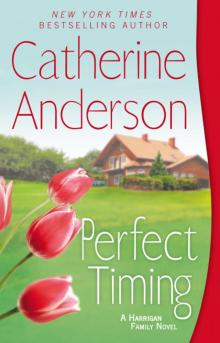 Perfect Timing
Perfect Timing New Leaf
New Leaf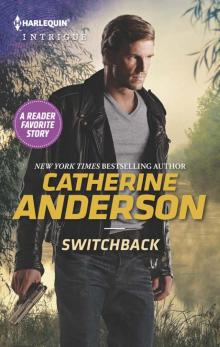 Switchback
Switchback Phantom Waltz
Phantom Waltz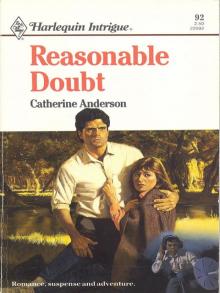 Resonable Doubt
Resonable Doubt Comanche Heart
Comanche Heart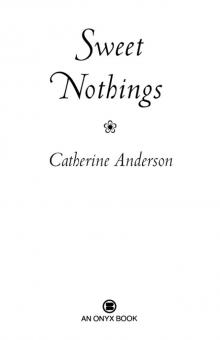 Sweet Nothings
Sweet Nothings Sun Kissed
Sun Kissed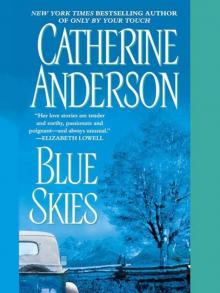 Blue Skies
Blue Skies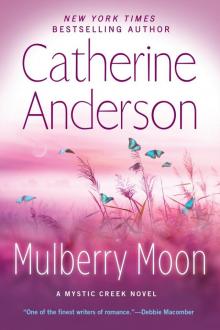 Mulberry Moon
Mulberry Moon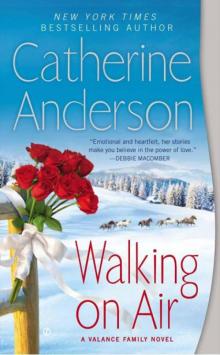 Walking on Air
Walking on Air Forever After
Forever After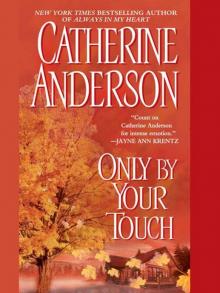 Only by Your Touch
Only by Your Touch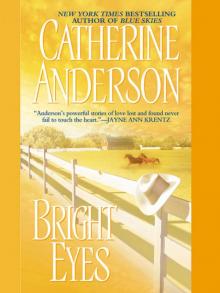 Bright Eyes
Bright Eyes Morning Light
Morning Light Indigo Blue
Indigo Blue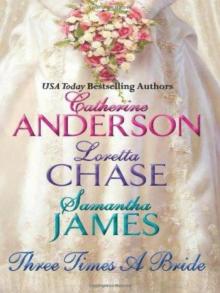 Fancy Free (Three Times a Bride Anthology)
Fancy Free (Three Times a Bride Anthology)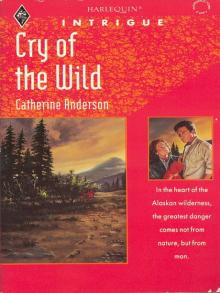 Cry of the Wild
Cry of the Wild Here to Stay
Here to Stay Star Bright
Star Bright The Christmas Room
The Christmas Room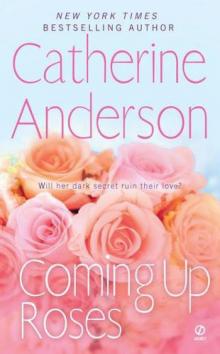 Coming Up Roses
Coming Up Roses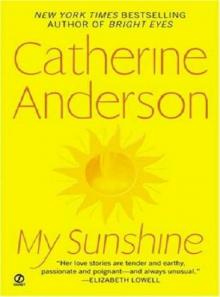 My Sunshine
My Sunshine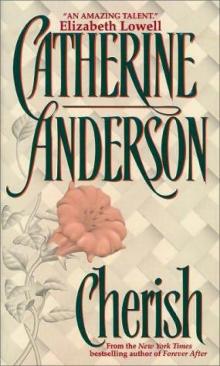 Cherish
Cherish Strawberry Hill
Strawberry Hill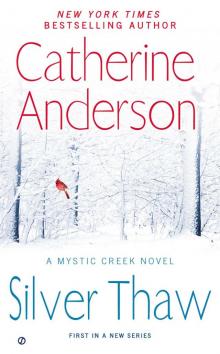 Silver Thaw
Silver Thaw Comanche Moon
Comanche Moon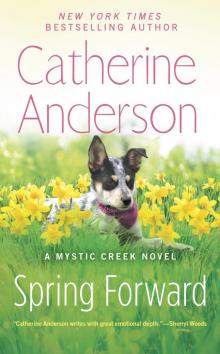 Spring Forward
Spring Forward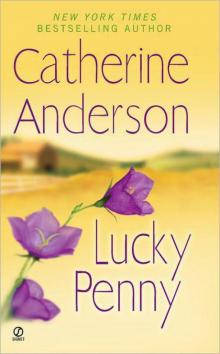 Lucky Penny
Lucky Penny Early Dawn
Early Dawn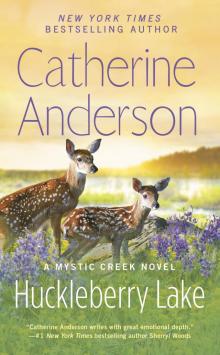 Huckleberry Lake
Huckleberry Lake Summer Breeze
Summer Breeze Without a Trace
Without a Trace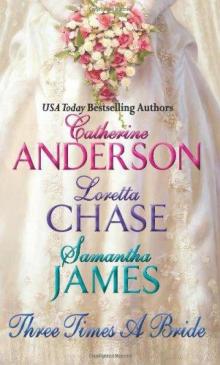 Three Times a Bride
Three Times a Bride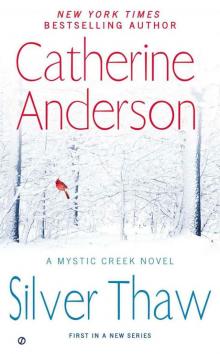 Silver Thaw: A Mystic Creek Novel
Silver Thaw: A Mystic Creek Novel